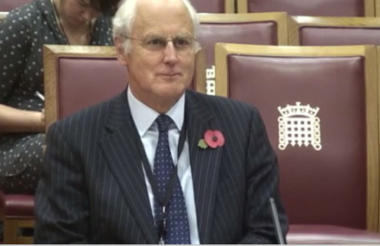Too few charities have made the changes necessary to scale up good ideas, including taking on social investment, the House of Lords Select Committee on Charities heard yesterday.
Giving oral evidence yesterday, Lord Hodgson of Astley Abbotts, who published a review of charity regulation in 2012, said that charities “can find change difficult”.
“Too few charities appear ready to say ‘we’ve got a really good thing we’re doing here and we’re ready to do so more widely – but to do that we’ve got to up our game,’” he said.
He said that social investment was one of the areas where charities had “moved slowly”, even though it was an ideal tool to help charities grow in scale.
He said: “Many of us feel that social investment is a real opportunity to scale up the funding available to charities but it does require charities being prepared to make the changes that are necessary to take the money on board.”
Use of social media was the other area that Hodgson said he felt charities had been slow to adapt.
Hodgson also told peers that he thought trustees’ terms should be limited to three three-year terms, or they should have to explain why not in their annual report.
‘Parliament should set example on volunteering’
Lady Scott, one of the committee members, expressed disappointment that the Houses of Parliament itself did not have a scheme to help people be more involved in communities.
Responding to comments from Hodgson about the benefits corporate volunteering had brought to companies, she asked if it was “odd” that “Parliament doesn’t have such a scheme” that to encourage “people who work in either house going out into the local community”.
She said she had looked for opportunities but not found them and said “we ought to lead by example”.
More support for governance and leadership
In the second evidence session of the afternoon Shaks Ghosh, chief executive of Clore, told peers that there needed to be more investment in skills and leadership development at charities, both at board and trustee level.
She said the Charity Commission could do more to support the sector by “showcasing” examples of “good governance, leadership and trusteeship” and by directing new trustees to relevant training available.
“There’s a lot more the Charity Commission could do” she said in terms of “nudging” trustees to encourage “behaviour change”.
She also said she was concerned about the fall in public trust and confidence, and that it “pierces my heart” that people are “starting to question our role and have confidence in what we do”.
She added that when she was chief executive of Crisis she was “proud” that in trust surveys the charity sector was on the same level as organisations like the BBC, but that “now we are below where supermarkets are and that doesn’t feel right”.
Get more young people involved
Eve Martin, chair of sexual health charity Brook, explained how her charity had done more to increase the involvement of young trustees on its board, and urged the committee to recommend that trustee boards should become more diverse.
“I really urge all charitable boards to think about how they recruit,” she said, and that to find younger trustees “we didn’t bother with the traditional recruitment process, but usd social media”.
She said: “They are trustees with full responsibility – you just have to trust they and give them the right support.”
The young trustees on her board make an “amazing contribution” and are “really challenging”.
She said charities need to think about how they conduct trustee meetings, and do more over video conference or email, to make it possible for young people with full time jobs to get involved.









